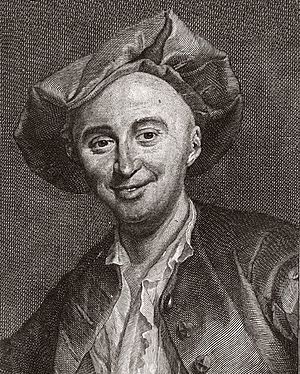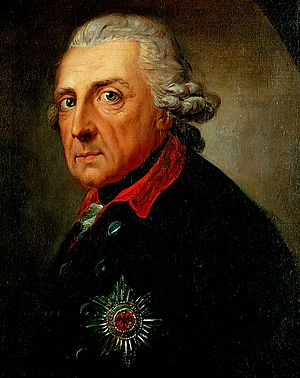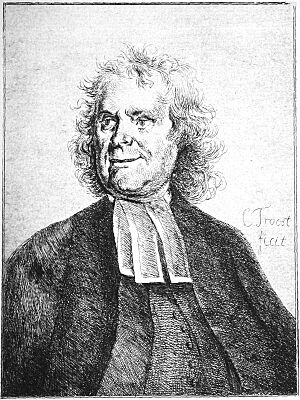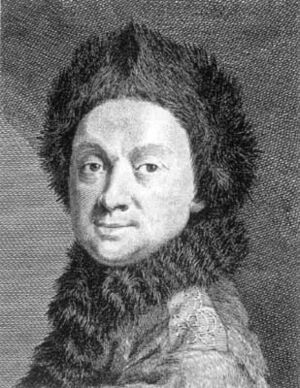Julien Offray de La Mettrie facts for kids
Quick facts for kids
Julien Offray de La Mettrie
|
|
|---|---|
 |
|
| Born | 23 November 1709 |
| Died | 11 November 1751 (aged 41) |
| Alma mater | University of Rennes |
| Era | 18th-century philosophy |
| Region | Western philosophy |
| School | French materialism |
|
Main interests
|
Mind–body problem |
|
Notable ideas
|
Mechanistic materialism |
|
Influences
|
|
|
Influenced
|
|
Julien Offray de La Mettrie (November 23, 1709 – November 11, 1751) was a French doctor and philosopher. He was one of the first French thinkers of the Enlightenment to believe that everything, including humans, is made of matter. He is most famous for his 1747 book, L'homme machine (which means Man a Machine).
La Mettrie is remembered for his idea that humans are complex animals. He thought that our minds are part of our bodies, just like other animals. He also believed that life should be lived to find happiness and pleasure. His ideas were very new and different for his time. Because of this, he had to leave France and move to Berlin.
Contents
Early life and education
Julien de La Mettrie was born in Saint-Malo, France, on November 23, 1709. His father was a successful cloth seller. Julien first went to schools in Coutances and Caen. After attending the Collège du Plessis in Paris, he thought about becoming a clergyman. He studied theology (the study of religion) for some years. But then, his interests changed, and he turned away from the Church.
In 1725, La Mettrie started studying philosophy and natural science at the College d'Harcourt. He likely finished his studies around 1728. At this time, this college was a leader in teaching the ideas of a famous philosopher named Descartes. In 1734, La Mettrie went to study with Herman Boerhaave, a very famous doctor. Boerhaave had also planned to become a clergyman first. It was under Boerhaave that La Mettrie was inspired to try and improve medical education in France.
Medical career and new ideas
After his studies, La Mettrie decided to become a doctor. A family friend, François-Joseph Hunauld, who was about to become a professor of anatomy, helped him make this choice. For five years, La Mettrie studied medicine in Paris. He learned a lot from Hunauld.
In 1733, he traveled to Leiden to study with the famous Herman Boerhaave. His time in Holland was short but very important for his ideas. In the next few years, La Mettrie became a doctor in his hometown of Saint-Malo. He shared Boerhaave's ideas by writing and translating several books. He got married in 1739 and had two children, but his marriage was not happy.
In 1742, La Mettrie left his family and went to Paris. He became a surgeon for the French Guards army group. He took part in several battles during the War of the Austrian Succession. This experience made him strongly dislike violence. He spent a lot of time in Paris. It was probably then that he met other important thinkers like Maupertuis and the Marquise de Châtelet.
During these years, La Mettrie got a fever. While he was sick, he noticed how his faster blood circulation affected his thoughts. This led him to believe that our mental processes are caused by changes in our brain and nervous system. He wrote about this idea in his first philosophy book, Histoire naturelle de l'âme (1745). People were so upset by this book that La Mettrie had to leave his job with the French Guards. He found safety in Leiden. There, he wrote his ideas even more boldly in L'Homme machine. This book was written quickly and said that humans are like machines, based on ideas that everything is made of matter and there is no God. La Mettrie's ideas about matter came from his medical work and earlier doctors.
He later explored the ideas of right and wrong in his book Discours sur le bonheur. La Mettrie thought this was his most important work. In it, he talked about his "theory of remorse." This was his idea that feeling guilty from a young age can have bad effects. This idea made almost all other thinkers of the French Enlightenment dislike him. His work was largely forgotten for a hundred years until another philosopher, Friedrich Albert Lange, brought it back to attention.
Philosophy and human nature
Julien de La Mettrie is seen as one of the most important thinkers of the 1700s who believed in determinism. This is the idea that everything that happens is already decided. He thought that our mental processes are caused by our bodies. He wrote about these ideas in his most important book, Man a Machine. In this book, he said that humans work like machines. This idea built on the work of Descartes, who also thought the human body worked like a machine. La Mettrie believed that both the human body and mind work like a machine. He disagreed with Descartes' idea that the mind and body are separate. He even said that Descartes was actually a materialist when it came to the mind.
Humans and animals
Before Man a Machine, La Mettrie published The Natural History of the Soul in 1745. In this book, he said that humans are just complex animals. Many people disagreed with his belief that "from animals to man there is no abrupt transition." He later expanded on this idea. He claimed that humans and animals are made of organized matter. He believed that the only difference between humans and animals is how complex that matter is organized. He compared the differences between humans and animals to the differences between a fancy pendulum clock and a simple watch. He said that humans are to apes "as the planetary pendulum of Huygens is to a watch of Julien Le Roy".
His idea that there was no real difference between humans and animals came from his observations. He saw that animals and even plants could have sensory feelings. While he knew that only humans spoke a language, he thought animals could learn one. He used apes as an example, saying that if they were trained, they would be "perfect [men]". He also suggested that humans learn by copying others, just like animals do.
His beliefs about humans and animals were based on two types of connections. The first was "weak continuity," meaning humans and animals are made of the same things but are organized differently. His main focus, however, was on "strong continuity." This was the idea that the way humans and animals think and behave is not that different.
Man a machine
La Mettrie believed that humans work like machines because our thoughts depend on our body's actions. He argued that human thought comes from matter being organized in a very complex way. He did not believe that God existed. Instead, he argued that humans are organized in the best way possible to use complex matter.
La Mettrie came to this belief after realizing that his body illnesses and mental illnesses were connected. After gathering enough evidence from medicine and psychology, he published his book.
Some of the evidence La Mettrie used was questioned. For example, he pointed to a chicken running around after its head was cut off, or an animal's heart still beating after being removed. He used these examples to show the connection between the brain and the body. While later theories built on La Mettrie's ideas, his writings were not always strictly scientific. Instead, his works were often controversial and challenged common beliefs.
Human behavior
He also expressed his strong beliefs by saying he was a determinist. This meant he thought that judges were not really needed because everything is already decided. He disagreed with Christian beliefs. He stressed the importance of seeking pleasure, which is called a hedonistic approach to human behavior. He also questioned the idea that humans have a higher sense of right and wrong than animals. He noted that animals rarely hurt each other badly. He argued that some animals were capable of some level of morality. He believed that as machines, humans would follow the laws of nature. He thought they would ignore their own interests for the good of others.
Influence on others
La Mettrie most directly influenced Pierre Jean Georges Cabanis, a well-known French doctor. Cabanis used La Mettrie's ideas about matter but made them less extreme. La Mettrie's very strong beliefs were largely rejected. However, his work did help influence psychology, especially behaviorism. This is a field that studies how we learn behaviors. His influence can be seen in how behaviorists break down problems into simpler parts. But because of the strong negative reactions he received, many behaviorists knew little about La Mettrie. They instead built on the ideas of other thinkers who had similar arguments.
Later life and death
Journey to Prussia

La Mettrie's ideas about pleasure and matter caused anger even in the more open-minded Netherlands. People were so strongly against him that in 1748, he had to leave for Berlin. There, thanks to Maupertuis, the Prussian king Frederick the Great not only let him work as a doctor but also made him his personal reader. In Berlin, La Mettrie wrote Discours sur le bonheur (1748). This book shocked leading thinkers of the Enlightenment like Voltaire and Diderot. This was because it openly said that seeking pleasure above all else was the most important thing.
Death
It is said that La Mettrie's love for pleasure led to his early death. The French ambassador to Prussia, Tyrconnel, was thankful to La Mettrie for curing him of an illness. He held a big dinner in La Mettrie's honor. It was claimed that La Mettrie wanted to show how much he could eat or how strong he was. So, he ate a very large amount of pâté de faisan aux truffes (a rich dish with pheasant and truffles). Because of this, he got a gastric illness (a stomach sickness). Soon after, he had a bad fever and eventually died.
Frederick the Great gave the speech at La Mettrie's funeral. This speech is the main source of information about La Mettrie's life. Frederick said: "La Mettrie died in the house of Milord Tirconnel, the French ambassador, whom he had saved. It seems that the disease, knowing who it was dealing with, was clever enough to attack his brain first, to make sure it destroyed him. A strong fever with wild confusion came on. The sick man had to ask his fellow doctors for help, but he could not find the relief that his own skill had so often given to himself and others." Frederick also described him as a good person and doctor, but a very bad writer. La Mettrie was survived by his wife and a 5-year-old daughter.
La Mettrie's collected philosophical works, Œuvres philosophiques, were published after his death in different editions in London, Berlin, and Amsterdam.
Works
Selected works
- Histoire Naturelle de l'Âme. 1745 (published anonymously)
- L'Homme Machine. 1748 (published anonymously)
- Discours sur le bonheur. 1748 (published anonymously)
Images for kids
-
In Leiden, La Mettrie studied under the famous physician Herman Boerhaave (pictured above).
-
Pierre Louis Maupertuis, also from Saint-Malo, helped La Mettrie find safety in Prussia.
-
The court of Frederick the Great provided La Mettrie with a safe place to write and publish his works.
See also
 In Spanish: Julien Offray de La Mettrie para niños
In Spanish: Julien Offray de La Mettrie para niños
 | Delilah Pierce |
 | Gordon Parks |
 | Augusta Savage |
 | Charles Ethan Porter |






